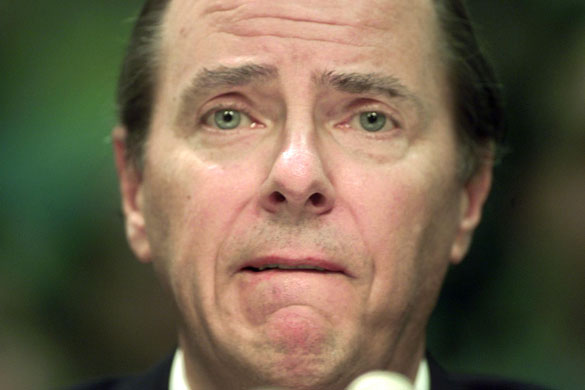The above photo of Jeffrey Skilling testifying before Congress ran in The Guardian. Which, as I'm sure you know, is a British paper. So yes, the man's spectacular skulduggery as Enron C.E.O. made him world-famous.
Today's arguments before the Supreme Court, however, will address the issue of whether or not in this, the Internet age, did they make him too famous in Houston, Texas, to get a fair trial?
Adam Liptak pondered this question in yesterday's New York Times:
A Houston Chronicle column about his trial on fraud charges was headlined “Your Tar and Feathers Ready? Mine Are.” A rap song appeared called “Drop the S Off Skilling.” And potential jurors in Mr. Skilling’s trial told the court that he was “a high-class crook” who “should be reduced to having to beg on the corner and live under a bridge.”Not exactly dispassion on two feet, is it?
Mr. Liptak went on to point out:
It has been two decades since the Supreme Court has considered a major change of venue case, and its jurisprudence is still rooted in decisions based on small communities dominated by a single local newspaper and perhaps a few local television news outlets. The law has been slow to adapt to a more general, more intense and yet more atomized media environment.
How potential jurors become informed in the Internet era, experts in jury behavior said, cuts in two directions. It may now be harder than ever for defendants to find wholly untainted jurors in their own communities. At the same time, a change of venue in a truly high-profile case is less likely than ever to solve the problem.In other words, when Enron sank and took many an innocent investor and employee with it, we were all Houstonian in our anger at those responsible.
And those responsible certainly included Mr. Skilling--at least according to the Houston jury that convicted him. The question before the Supreme Court today is, was Houston, a city seething with antipathy toward Skilling, the proper venue for his trial?
In today's arguments before the Supreme Court (in a Bloomberg.com report) . . .
The 12 jurors reflected that antipathy, Skilling contends. During pretrial questioning, three said they were “angry,” three said they had negative feelings toward Skilling or doubted his impartiality and one said that all CEOs were “greedy,” according to his appeal.What Jeffrey Skilling wants is a new trial, somewhere else. And what I want is to know what you think--did Enron's former CEO get a fair trial? If not, where could he get one in this Internet Age? And, perhaps most tellingly, do you think you could consider evidence impartially as a Skilling trial jury member?
On appeal, incidentally, are all of Mr.Skilling's 19 convictions. According to court watchers, the Supremes have indicated that they will probably overturn at least one conviction, the one for depriving "another of the intangible right to honest services.”
The case is Skilling v. United States, 08-1394.
Note: Hear what Nina Totenberg had to say about the arguments on Monday's ATC.












The Supreme Court is a dangerous place for anyone looking to protect the rights of consumers, homeowners, workers, and others who aren't active in the corporate culture of wealth. Their recent decisions regarding Corporate Citizenship and the handcuffing of the EPA show a complete embrace of Corporate rule in America. I'll be very surprised if Jeffrey Skilling doesn't go scot free after his SCOTUS hearing. This court will side with Corporate America who, for them, is REAL America. Consumers and Voters beware. We are becoming increasingly irrelevent.
ReplyDeleteThanks so much for the comment, Brent. Anyone else??
ReplyDeleteGood blog. Too big to fail, too famous for trial. If you owe the bank $10K the bank owns you, if you owe the bank 10 Mil you own the bank. I'm starting to suspect this country isn't run for the benefit of people like you and me. Do you think this terrorist trial in NY is the same. Can he get a fair trial?
ReplyDelete